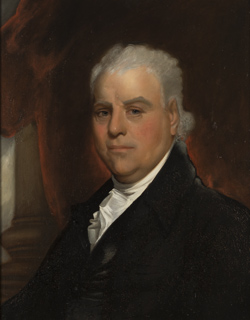John McWhorter from a trifling incident that happen’d in the Weymouth Alarm, in which I was oblig’d to take his Gun by force, has wag’d an eternal war with the Neighbourhood and now lives in a surly, morose, malicious, damn’d Scotch looking manner without conversing with his Family or Friends.John McWhorter was a big man in Taunton. He owned a tavern where John Rowe visited (calling him “McQuarters”), the local Sons of Liberty reportedly met, and attorney and near neighbor Daniel Leonard supped after his wife died. It contained upscale tea tables and was still referred to as “McWhorter’s Inn” years after his death—probably because his wife kept it running most of the time. McWhorter also owned at least one slave, and he had interests in shipping.
Most important for the war effort, McWhorter was part-owner of an ironworks in Stoughton. (David Cobb’s father had also been in the iron business.) Responding to a resolution of the Massachusetts Provincial Congress in February 1775, Stoughton’s committee of inspection
stopped upwards of a Ton of Iron, the Property of John McWhorter of Taunton, by seizing and storing the same in the Town of Stoughton, which Iron they had every probable Reason to suspect was designed for the Use of the British Army.Whether or not that suspicion was accurate, as war approached people clearly regarded McWhorter as a potential Loyalist. And he no doubt perceived Patriot officials as infringing on his property.
That was the situation when there was an alarm about the Royal Navy threatening Weymouth in the summer of 1775. With many of the region’s fighting men off at the siege of Boston, the task of defending the coast fell to militia companies, including the men of Taunton. A “trifling incident” during that tense time prompted Cobb to confiscate McWhorter’s musket.
In December 1776 Taunton’s militia commander noted that McWhorter was one of twenty men on the town’s “alarm list” who hadn’t turned out to protect Rhode Island from the return of the British military. Of course, McWhorter couldn’t have turned out for militia service if Cobb still had his gun.
McWhorter’s feuds continued. On 5 May 1777 the town’s committee of correspondence considered “the verbal complaint of Mr. [John?] Porter [a committee member] respecting the abuse he received from Mr. McWhorter[;] after hearing both parties, the Chairman was desired to give Mr. McWhorter a reprimand which was accordingly done.”
Back in 1776 the Stoughton committee had sold the confiscated iron, offering McWhorter “24s. per Hundred for said Iron, and Interest from the Time it was seized and stored.” But he refused and sued the committee members for “£486, Lawful Money.”
Just before the case was to be tried in June 1779, the committee brought the Massachusetts General Court into the dispute. In September the legislature ordered the Stoughton committee to pay £30.7s.4p. for the iron—basically the initial offer, nowhere close to what McWhorter had demanded.
John McWhorter stayed in Taunton through the war and died in 1800. By then he had probably reconciled himself to his neighbors and they to him, but people might still have been surly and morose.

No comments:
Post a Comment